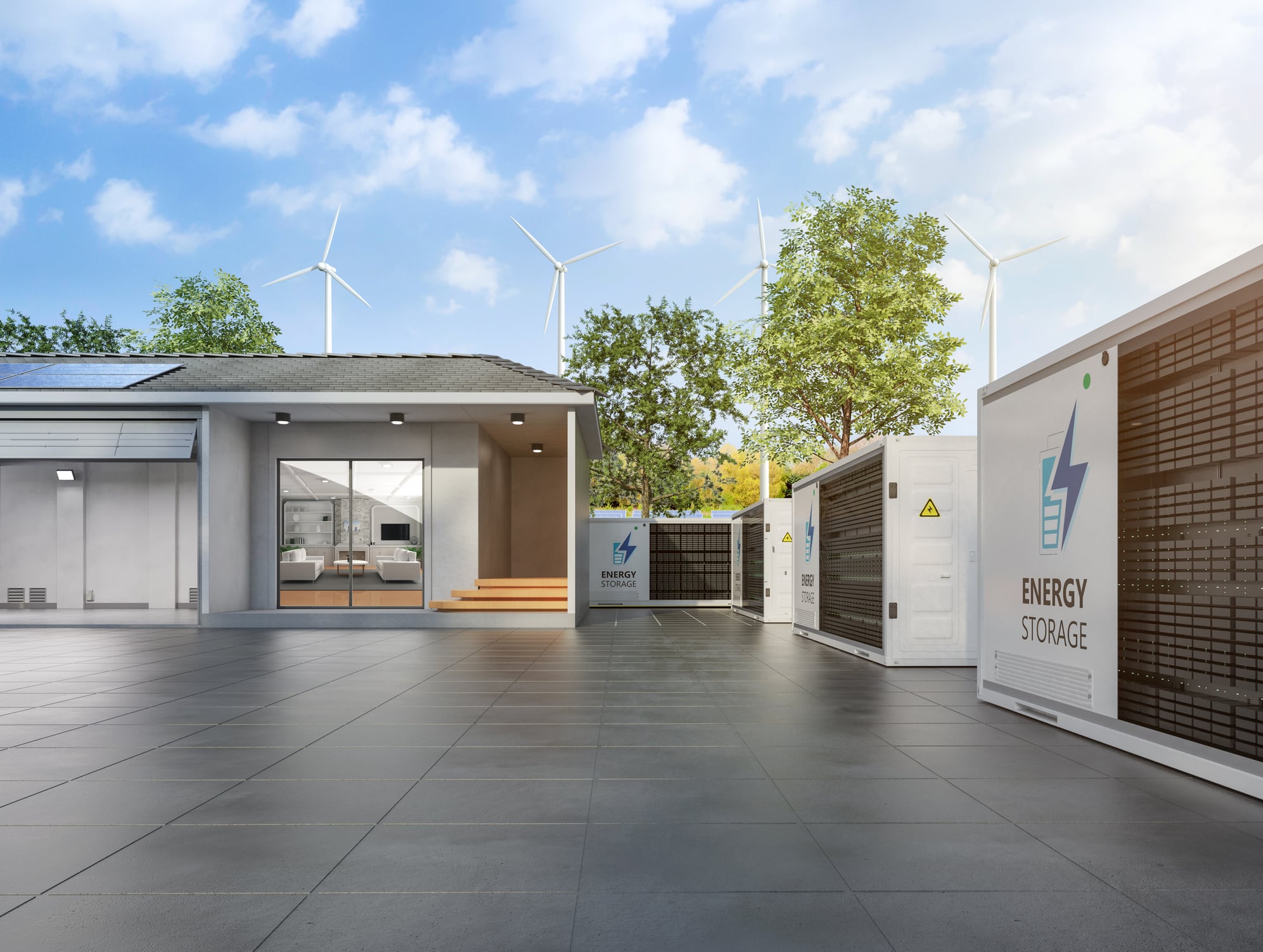In today’s rapidly evolving energy landscape, the importance of efficient and reliable power solutions cannot be overstated. Residential energy storage systems are emerging as a game-changer for homeowners seeking to optimize their energy usage and enhance their power security. These systems not only offer a way to manage energy more effectively but also provide a robust backup power solution that can keep your home running smoothly during outages.
For residents of Columbia, SC, and surrounding areas like Blythewood and Gilbert, the adoption of residential energy storage represents an opportunity to take control of their energy future. By storing excess energy generated during low-usage periods, homeowners can use it during peak times, reducing reliance on the grid and potentially lowering energy costs. This shift towards self-sufficiency is not only economically savvy but also environmentally friendly.
Moreover, the peace of mind that comes with having a residential energy storage system in place is invaluable. In areas prone to power outages, having a backup power source means that your home remains operational, keeping lights on, appliances running, and essential devices charged. This level of preparedness can significantly reduce the stress and inconvenience caused by unexpected power disruptions.
As we delve deeper into the benefits of residential energy storage, it’s clear that these systems are more than just a backup plan; they’re a smart investment in your home’s energy future. Whether you’re in Columbia, Blythewood, or Gilbert, SC, exploring how residential energy storage can enhance your home’s efficiency and resilience is a step towards a more sustainable and secure energy solution.

Understanding Residential Energy Storage Systems
Residential energy storage systems are innovative solutions designed to enhance energy management in homes. They work by storing electricity when demand and cost are low and releasing it during peak times. This process not only ensures a more efficient use of energy but also contributes to significant savings on utility bills. Homeowners in Columbia, SC, find this feature especially beneficial, as it allows for more control over their energy consumption.
One of the key components of these systems is their ability to serve as a reliable backup power source. In the event of a power outage, the stored energy can be utilized to keep critical appliances running smoothly. This means that residents in Blythewood, SC, can maintain their comfort and safety even when the grid is down. It’s a seamless transition that provides uninterrupted power, ensuring that life goes on as usual without any major disruptions.
Moreover, residential energy storage systems are pivotal in supporting the integration of renewable energy sources, such as solar panels, into the home energy mix. By storing excess energy generated during sunny days, these systems make it possible to use solar power even when the sun isn’t shining. This capability is particularly appealing to environmentally conscious homeowners in Gilbert, SC, who are looking to reduce their carbon footprint and contribute to a greener planet.
Lastly, the adoption of residential energy storage systems is a step forward in enhancing the overall energy resilience of a community. As more homes in South Carolina equip themselves with these systems, the collective demand on the local grid decreases. This not only leads to a more stable and reliable energy supply but also paves the way for a future where communities can sustain their energy needs more independently.
The Benefits of Implementing Residential Energy Storage
Residential energy storage offers significant benefits, particularly when it comes to enhancing energy independence. Homeowners in Columbia, SC, can store energy during off-peak hours for use during high-demand periods. This not only ensures a steady supply of electricity but also reduces dependence on the grid. As a result, families enjoy greater control over their power usage and stability.
In addition to energy independence, these systems significantly improve financial savings. By utilizing stored energy during peak pricing times, homeowners can avoid higher electricity rates. This smart management of energy consumption can lead to noticeable reductions in monthly utility bills. Residents in Blythewood, SC, find this aspect especially appealing, as it allows for more efficient budgeting and spending on energy costs.
Another key advantage is the environmental impact. Residential energy storage systems enable the use of renewable energy sources more effectively. For example, excess solar power can be stored and used later, reducing the need for fossil-fuel-based power. This shift towards greener energy solutions is particularly important for environmentally conscious individuals in Gilbert, SC, who strive to minimize their carbon footprint.
Lastly, these systems contribute to community resilience. As more homes in South Carolina adopt residential energy storage, the collective strain on the local grid diminishes. This leads to a more reliable energy supply for everyone and sets the stage for communities to be more self-reliant in their energy production and consumption. It’s a forward-thinking approach that benefits not just individual households but the broader community as well.
How Residential Energy Storage Works
Understanding how residential energy storage operates is key to appreciating its value in a home’s energy ecosystem. At its core, the system captures electricity generated during low-demand periods, storing it for future use. This process is particularly efficient in Columbia, SC, where varying energy demands can dictate electricity costs throughout the day. Homeowners leverage this by using stored energy during peak hours, effectively reducing their reliance on the grid.
In Blythewood, SC, residents benefit from the seamless integration of these storage systems with renewable energy sources like solar panels. The stored energy, often derived from excess solar power generated during sunny days, can be used when solar output is low. This ensures a constant supply of green energy, reducing the household’s carbon footprint and supporting sustainable living practices. It’s a smart way to make renewable energy more reliable and accessible.
The technology behind residential energy storage is both advanced and user-friendly, allowing for easy management of energy reserves. Homeowners can monitor their storage levels and decide when to store or use electricity based on real-time data. This capability is especially useful in Gilbert, SC, where energy usage patterns can significantly impact utility bills. By optimizing energy storage and usage, families can achieve substantial savings.
Finally, the broader impact of adopting residential energy storage extends beyond individual homes to the community at large. As more residents in South Carolina incorporate these systems, the collective load on the local grid decreases. This not only enhances grid stability but also paves the way for a future where communities can withstand power outages more effectively. It’s a step towards creating a resilient, energy-independent community that benefits all.
Selecting the Right Residential Energy Storage Solution
When considering residential energy storage for your home, assessing your specific needs is crucial. Every household in Columbia, SC, has unique energy requirements based on size, energy consumption patterns, and goals for energy independence. This initial evaluation helps in determining the capacity and type of system that best matches your lifestyle, ensuring you get the most out of your investment. Tailoring the system to your needs maximizes efficiency and provides the desired level of backup power and energy management.
Exploring the different technologies available for residential energy storage is the next step. Lithium-ion batteries are popular due to their efficiency and longevity, making them a suitable choice for many homes in Blythewood, SC. However, other technologies like lead-acid batteries or flow batteries might be more appropriate depending on your specific energy storage and usage requirements. Understanding the pros and cons of each technology allows for an informed decision that aligns with your energy goals.
Integration with existing home energy systems is another vital consideration. For residents in Gilbert, SC, with solar panels, choosing a residential energy storage solution that seamlessly connects with your renewable energy setup enhances the overall efficiency of your energy system. It allows for the effective storage of excess solar power, ensuring you have a reliable energy supply even when the sun isn’t shining. This synergy between storage and generation sources is key to optimizing energy use and savings.
Finally, consulting with a professional can provide valuable insights into the best residential energy storage solution for your home. Experts in the field can offer personalized advice, taking into account local regulations, available incentives, and the specific energy landscape of South Carolina. This guidance ensures that your investment not only meets your current energy needs but also positions your home for future energy trends and technologies, making it a smart, long-term choice for energy management and independence.
Installation Process for Residential Energy Storage Systems
Deciding to install a residential energy storage system is a significant step towards energy independence and efficiency. The process begins with a thorough assessment of your home’s energy needs. Professionals conduct an evaluation, considering factors such as your home’s size, energy consumption patterns, and the existing electrical infrastructure. This ensures the system fits perfectly with your home’s requirements, optimizing its performance from day one.
Next, selecting the right location for the system’s installation is crucial. Installers look for a spot that’s both accessible for maintenance and safe from environmental elements. In Blythewood, SC, for example, considerations might include protection from extreme weather conditions to ensure the system’s longevity. The goal is to find a balance between accessibility and protection, ensuring the system operates efficiently for years to come.
The installation process itself involves integrating the system with your home’s existing electrical setup. Technicians in Gilbert, SC, work meticulously to connect the storage system, ensuring it aligns with local electrical codes and standards. This step is vital for the system’s safety and functionality, guaranteeing that it provides a reliable source of energy when needed most.
Finally, after the installation, a comprehensive testing phase ensures the system is operating correctly. Homeowners are also educated on how to monitor and manage their new energy storage system. This includes understanding how to maximize energy savings and ensure the system provides backup power effectively. With professional installation and proper maintenance, residential energy storage systems become a seamless part of your home’s energy solution, offering peace of mind and energy efficiency for years to come.
Maximizing Efficiency with Residential Energy Storage
Maximizing the efficiency of residential energy storage systems begins with understanding how to effectively manage energy consumption. Homeowners in Columbia, SC, can enhance their system’s performance by monitoring energy usage patterns and adjusting their consumption accordingly. This proactive approach allows for the optimization of stored energy, ensuring it’s used during peak demand times when electricity costs are highest. It’s a strategy that not only maximizes savings but also extends the lifespan of the storage system.
Incorporating smart technology into residential energy storage systems further boosts efficiency. Smart thermostats and energy management systems can automatically adjust energy usage, seamlessly integrating with the storage system. For residents in Blythewood, SC, this means their homes can intelligently use stored energy, reducing waste and enhancing overall system efficiency. This smart integration represents a significant step towards achieving a more sustainable and energy-efficient home.
Regular maintenance is crucial to maintaining the efficiency of residential energy storage systems. Homeowners should schedule periodic checks to ensure their systems are functioning optimally. This includes inspecting battery health, cleaning components, and updating software in Gilbert, SC. These maintenance activities not only prevent potential issues but also ensure the system operates at peak efficiency, providing reliable backup power and energy savings.
Finally, understanding and utilizing available incentives can make residential energy storage systems more economically viable. Many local and federal programs offer rebates or tax credits for installing energy-efficient systems. By taking advantage of these incentives, homeowners can offset initial installation costs, making it a more attractive investment. This financial strategy, coupled with the benefits of reduced energy bills and increased home value, makes residential energy storage an appealing option for those looking to enhance their home’s energy efficiency.
Financial Incentives and Savings
Understanding the financial benefits of residential energy storage can significantly influence a homeowner’s decision to invest in such a system. In Columbia, SC, the initial cost of installing a residential energy storage system is often offset by the long-term savings on energy bills. By storing energy during off-peak hours and using it during peak times, homeowners can avoid higher electricity rates, leading to noticeable reductions in monthly expenses. This smart use of stored energy not only lowers costs but also increases the value of the property.
Moreover, various incentives available for residential energy storage installation further enhance its financial appeal. In Blythewood, SC, homeowners may qualify for state and federal tax credits, rebates, and other financial incentives designed to encourage the adoption of energy-efficient technologies. These incentives can significantly reduce the upfront cost of installation, making residential energy storage a more accessible option for many. It’s a win-win situation, offering immediate financial benefits and contributing to a more sustainable future.
In addition to the direct financial savings, residential energy storage systems contribute to increased energy independence, reducing reliance on the grid. This independence can be particularly valuable in Gilbert, SC, where energy costs may fluctuate significantly. By optimizing the use of stored energy, homeowners can protect themselves against unpredictable increases in utility rates, ensuring more stable and predictable energy expenses. This level of control over energy costs is a key financial advantage of residential energy storage.
Finally, the long-term financial savings and environmental benefits of residential energy storage systems cannot be overstated. Over time, the reduction in energy costs, combined with the potential increase in home value and the availability of financial incentives, makes residential energy storage a wise investment. For homeowners in South Carolina, this means not only contributing to a greener planet but also enjoying substantial savings and financial security in the long run. It’s a forward-thinking choice that pays dividends in both financial and environmental terms.
Maintenance Tips for Your Energy Storage System
To ensure your residential energy storage system in Columbia, SC, remains in top condition, regular maintenance is essential. Checking the system’s connections and components for any signs of wear or damage can prevent unexpected failures. This proactive approach keeps the system running smoothly, safeguarding your home’s energy efficiency. By dedicating time to these checks, you extend the lifespan of your investment and ensure it continues to provide reliable service.
In Blythewood, SC, cleaning the energy storage system is another vital step in maintaining its efficiency. Dust and debris can accumulate on the system, potentially hindering its performance. A gentle cleaning of the exterior surfaces and ventilation areas helps maintain optimal operation. This simple task can significantly impact the system’s effectiveness and prevent overheating issues.
For those in Gilbert, SC, updating the system’s software is a crucial maintenance tip that often gets overlooked. Manufacturers regularly release updates that enhance the system’s functionality and security. Keeping the software up to date ensures your system operates with the latest efficiency improvements and security protocols. This not only boosts performance but also protects against potential cyber threats.
Finally, scheduling an annual inspection with a professional can catch issues that might not be obvious to the untrained eye. Experts can assess the system’s health, perform necessary calibrations, and recommend any needed repairs. This annual check-up ensures your residential energy storage system continues to meet your energy needs efficiently. With these maintenance tips, homeowners can enjoy the full benefits of their system, from reduced energy costs to increased energy independence.
Frequently Asked Questions
What is residential energy storage?
Residential energy storage lets homeowners save electricity for later use. It’s like a battery for your house, storing power from the grid or solar panels. This system helps manage energy costs and provides backup during outages. With it, you can keep lights on and appliances running, even when the power goes out.
How does it reduce energy bills?
Residential energy storage systems help lower energy bills by storing electricity when rates are low. You can then use this stored power during peak hours, avoiding high costs. This smart energy management means less reliance on the grid when prices spike. Overall, it leads to significant savings on your electricity expenses.
Can it power a home during outages?
Yes, residential energy storage can power your home during outages. It acts as a backup, supplying electricity when the grid fails. This means you can keep essential appliances running smoothly. It’s a reliable way to ensure comfort and safety during unexpected power cuts.
What are the costs of residential energy storage?
The cost of residential energy storage varies based on size and technology. Generally, investing in these systems means upfront expenses for the equipment and installation. Over time, they pay off by reducing your monthly energy bills. It’s a smart choice for efficient energy management and savings in the long run.
How long does installation take?
Installing a residential energy storage system is usually quick and hassle-free. Most setups are complete within a day, depending on the complexity of your system. Professionals handle the process, ensuring everything works perfectly from the start. This way, you can enjoy the benefits of energy storage without a long wait.





